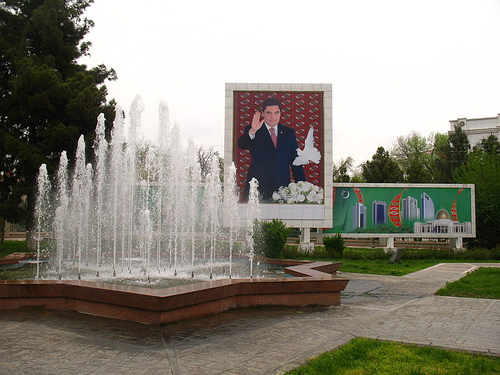TURKMENISTAN: Lonesome dictator invites opposition parties to form
Turkmenistan’s President Gurbanguly Berdimuhamedov has recently rocked the Internet by pondering the creation of new political parties in the country which currently allows only one party, the ruling Democratic Party of Turkmenistan (DPT).
In the beginning of 2012, following parliamentary approval, Berdimuhamedov signed a decree legalizing the establishment of new political parties. This measure was taken to ensure competition during presidential elections on February 12, 2012.
Then, in May 2012, the Union of Industrialists and Entrepreneurs (UIE) decided to set up a political party. That process has been spearheaded by Aleksandr Dadaev, the UIE chairperson, who is said to be [ru] a close friend of the Turkmen President. Dadaev is also a successful businessman, the owner of the country’s only private bank and a private newspaper, and the chairman of the Turkmen-Russian Business Council.
In fact, Berdimuhamedov had started talking about the creation of a multi-party system as early as 2010. He suggested [ru] uniting farmers by creating the Agrarian Party of Turkmenistan, without indicating when the party should be created and how.
As the country’s agrarians proved slow to mobilize, by May 2010 Berdimuhamedov was willing to allow the Turkmen opposition in exile to form a party and compete against him in the upcoming presidential elections. However, the exiles were not willing to go back to Turkmenistan because of fears for their safety.
So what is happening in Turkmenistan in 2012?
Some netizens believe that positive changes are afoot. They say that Berdimuhamedov is lonely without an opposition and wants to form a stable two-party system that will help Turkmenistan move in a democratic direction. Netizens also mention the Arab Spring as a potential catalyst of change that occurs in dictatorships.
As Discoursemonger argues [ru] on Lenta.ru:
все-таки арабская весна многим мозги вправила
The Arab Spring gave a lesson to many [dictators].
While, Vena, writing on the Turkmen Chronicles newsblog, said [ru]:
Режимы Ливии или Сирии не менее жестокие чем туркменские. И эти страны и народы не менее образованы и открыты чем Туркменистан. Но однако там народ встал на защиту своей свободы не взирая на человеческие потери. Нашли брешь режимов. Честь и хвала им. За это они достойны уважения. Никто не отрицает, много крови там пролилось и проливается. И возможно еще будут жертвы. Вес мир сожалеем этому, но не смотря на это все без исключения поддержали. Естественно кроме тех кто следующим в очереди как Северная Корея или Туркменистана. Все знают по другому там не могло ничего изменится. Диктаторские режимы добровольно не покидают свои насиженные места.
The regimes in Libya and Syria are as cruel as the Turkmen one. People in those countries are as educated as people in Turkmenistan. But [in Syria and Libya] people have stood up to defend their freedom, despite all the deaths [inflicted by the regimes]. They deserve praise and honor. They deserve respect. No one denies that a lot of blood has been spilled there. And there might be many more deaths. The whole world sympathizes [with people fighting against the regimes in Libya and Syria] and the whole world supports these people. Obviously, there is no support from countries such as North Korea and Turkmenistan which are next in line [for popular protests]. We all know that there was no other way to initiate change in those countries. Dictators do not leave their offices voluntarily.
Many are skeptical about the very idea of a genuinely opposition political party in Turkmenistan.
Bender-bey jested [ru]:
“В феврале текущего года глава республики призвал всех желающих создать оппозиционную партию.” Желающих провести остаток своей жизни в тюрьме не оказалось.
In February, the head of state urged all who are willing to form an opposition political party. But nobody has appeared to be willing to spend the rest of their life in prison.
On the Turkmen Chronicles website, debate is more earnest, with some netizens questioning [ru] whether or not people in Turkmenistan are ready for political pluralism.
Tahmasp alluded to the ‘real opposition’, when he said [ru]:
Демократический процесс в Туркменистане умер на корню, в народе нет понятия о демократических ценностях. Правящие круги(я уже об этом говорил) навязали народу свой страх потерять власть, внушая, что народовластие принесет нестабильность…Все происходящее уже даже не спектакль, а просто смена расстановки предметов в «мебельном магазине». Настоящие партии создаются из гражданских движений, снизу, а не сверху, т.е. правительством….Если бы не публикации правозащитников на Гундогаре и ХТ, туркменское руководство продолжало бы поручать создание новых партий зампредам правящего «кабинета министров».
The democratic process is dead in Turkmenistan; the nation does not have an understanding of democratic values. The ruling clique has imposed its own fear of losing power on the people, leading them to believe that the rule of people would cause instability… What is happening is not even a performance; it is akin to re-positioning furniture in a store. Real parties are formed on the basis of grassroots movements, not through a top-down decree by the government…If [websites like] Gundogar and Chrono-tm did not talk about it, the Turkmen government would continue instructing [government officials] to create new political parties.
But what if a loyal associate like Alexander Dadaev decides to betray a friend? And how much power Berdymuhamedov is actually ready to share?
Underneath an article about Dadaev, Turkmen netizens discuss who he is and what he is trying to achieve. Different discussants describe him as a presidential ally, oligarch, or thief, but also an honest entrepreneur. Given his talents in business, will he show the same strengths in lawmaking and avoid joining the political ‘black list’ populated by other dissidents?
Tahmasp ventured [ru]:
Александр Дадаев в том числе работал заместителем хакима города Ашхабада в 2004-2005 годах. После того как против него было возбуждено уголовное дело по статье хищение государственного имущества, публично в газетах покаился перед Туркменбаши и предложил сдать все свое имущество на тот момент в качестве компенсации…
Dadaev worked as a deputy Mayor of Ashgabat in 2004-2005. And when he faced criminal charges and accusation in appropriation of state property, he publicly asked for forgiveness from Turkmenbashy and offered to surrender all his property as a compensation…
To which another discussant, ‘businessman from Turkmenistan,’ responded [ru]:
Пожалуйста не надо лить грязь, Александр Дадаев трудяка и не кто и не когда ему не приносил не чего на чистом блюдечке с голубой коемочкой…
Please do not tarnish the image of Aleksandr Dadaev. He is a hard-working person and he has achieved a lot without anybody’s help or support…
Finally, Bazar invoked [ru] Marxist dialectical materialism to explain why even competition created from above can be fatal for authoritarian regimes:
Создание подручной партии рано или поздно приведет к политическому противостоянию интересов бизнеса. (Капитал определяет политику- К.Маркс). Как я предсказал, оппозиционные партии и движения отталкиваются от разности интересов и любая подручная партия в будущем будет в оппозиции.
The creation of a puppet party will sooner or later lead to a [real] political rivalry between [competing] business interests (Capital defines politics – Karl Marx). As I have already said, opposition parties and movements will develop their own dissimilar interests, and any puppet party will end up being in opposition to the government.
By Anna Fergana in Global Voices.

























Comments